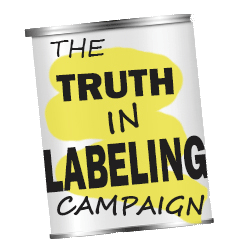The fiction that monosodium glutamate (MSG) is a harmless food additive has several key components:
- Rigged studies and bold-faced lies.
- A vigorous PR effort (currently being conducted by Daniel J. Edelman Public Relations).
- Paid media, in the form of “sponsored” content (that you may not realize is bought and paid for).
- “Earned” media – meaning legitimate journalists with access to top-tier outlets (think Wall Street Journal) who have been enlisted to write up articles that look and sound like real news, but are simply industry’s messaging done in the “voice” of the publication. This method also works with celebrities (especially chefs), bloggers and anyone else who has a big social media following.
And if you think that the flood of glutamate-industry propaganda has been torrential lately, you’re absolutely right. Ajinomoto, the world’s largest manufacturer of monosodium glutamate, is in the middle of a 10-million-dollar PR blitz (according to Ajinomoto), to “persuade Americans that MSG is safe—and maybe even good for you…”
We can’t always say for sure who is responsible for spreading the Glutes’ words so far and wide, but it seems only appropriate to share the names of some of the authors and outlets that enable them. For more about glutamate-industry propaganda, look here and here.
Rachael Ray Every Day, May, 2019
“Surprise: MSG Has Been Completely Safe to Eat All This Time”
Author: Hillary Maglin
https://www.rachaelraymag.com/whats-new/why-msg-is-safe-to-eat
BBC future, May, 2019
“The man who discovered umami”
Author: Veronique Greenwood
http://www.bbc.com/future/story/20190503-the-mystery-taste-that-always-eluded-us
BBC Future, November, 2015
Is MSG as bad as it’s made out to be?
Author: Bianca Nogrady
www.bbc.com/future/story/20151106-is-msg-as-bad-as-its-made-out-to-be\
The Wall Street Journal, April, 2019
“The FDA Says It’s Safe, So Feel Free to Say ‘Yes’ to MSG”
Author: River Davis
https://www.wsj.com/articles/rescuing-msgs-unsavory-reputation-11556337610
WebMD, February, 2019
“Is MSG really so bad?”
Author: Sally Kuzemchak, MS, RD
https://blogs.webmd.com/food-fitness/20190219/is-msg-really-so-bad
Lifehacker Skillet, January, 2019
“Put MSG in everything, you cowards”
Author: Claire Lower
https://skillet.lifehacker.com/put-msg-in-everything-you-cowards-1831721707
Men’s Health, January, 2019
“Is MSG Bad for You? No – and Here’s Why”
Author: Chris Mohr, Ph.D, RD
https://www.menshealth.com/nutrition/a26006305/msg-not-bad-for-you/
fivethirtyeight, January, 2016
How MSG Got A Bad Rap: Flawed Science And Xenophobia
Author: Anna Maria Barry-Jester
https://fivethirtyeight.com/features/how-msg-got-a-bad-rap-flawed-science-and-xenophobia/
Decoding Delicious, March, 2013
What is MSG, and is it safe to eat? –
Author: Amanda Green
www.decodingdelicious.com/what-is-msg/
Lifehacker, December, 2018
“Stop being afraid of MSG”
Author: Beth Skwarecki
https://vitals.lifehacker.com/stop-being-afraid-of-msg-1831011967
Esquire, October, 2018
“It’s time for America to fall back in love with MSG”
Author: Joanna Rothkopf
https://www.esquire.com/food-drink/food/a23566452/its-time-for-america-to-fall-back-in-love-with-msg/
The Seattle Times, October, 2018
“Avoiding MSG? Look beyond the myths”
Author: Carrie Dennett
https://www.seattletimes.com/life/wellness/avoiding-msg-look-beyond-the-myths/
Berkeley Wellness, October, 2018
“Is MSG Safe?”
Author: Keng Lam MD
https://www.berkeleywellness.com/healthy-eating/food-safety/article/msg-safe
US News & World Report, October, 2018
“Scientists Have Known MSG is Safe for Decades. Why Don’t Most Americans?”
Author: Toby Amidor
https://health.usnews.com/health-news/blogs/eat-run/articles/2018-10-10/scientists-have-known-msg-is-safe-for-decades-why-dont-most-americans
Business Insider, August, 2014
Is MSG Sodium In Chinese Food Safe To Eat?
Author: Kevin Loria
https://www.businessinsider.com/is-msg-sodium-in-chinese-food-safe-to-eat-2014-8
Business Insider, February, 2017
Everyone should cook with MSG, says food scientist
Author: Gus Lubin
https://www.businessinsider.com/cooking-with-msg-supersalt-2017-2
BuzzFeed, August, 2013
The Notorious MSG’s Unlikely Formula For Success
Author: John Mahoney
https://www.buzzfeed.com/johnmahoney/the-notorious-msgs-unlikely-formula-for-success
Slate, May, 2006
Could MSG make a comeback?
Author: Sarah Dickerman
https://slate.com/human-interest/2006/05/could-msg-make-a-comeback.html
Reader’s Digest, August, 2018
“What is MSG – and how bad is it, really?
Author: Denise Mann, MS
https://www.rd.com/health/wellness/what-is-msg-and-how-bad-is-it-really/
Blog: MyFitnessPal, September, 2016
Is MSG Safe?
Author: Monica Reinagel
https://blog.myfitnesspal.com/is-msg-safe/
Skeptical Raptor, July, 2018
“MSG myth – debunked with real science”
https://www.skepticalraptor.com/skepticalraptorblog.php/msg-myth-versus-science/
Self, June, 2018
“We all really need to stop freaking out about MSG”
Author: Yvette d’Entremont
https://www.self.com/story/we-all-really-need-to-stop-freaking-out-about-msg
The Guardian, May, 2018
“Chinese restaurant syndrome: has MSG been unfairly demonized?”
Author: Joanna Blythman
https://www.theguardian.com/lifeandstyle/2018/may/21/chinese-restaurant-syndrome-has-msg-been-unfairly-demonised
The Guardian, July 2005
If MSG is so bad for you, why doesn’t everyone in Asia have a headache?
Author: Alex Renton
https://www.theguardian.com/lifeandstyle/2005/jul/10/foodanddrink.features3
Financial Times, May, 2015
OMG I love MSG
Author: Tim Hayward
Not available online
Smithsonian.com, November, 2013
It’s the Umami, Stupid. Why the Truth About MSG is So Easy to Swallow
Author: Natasha Geiling
https://www.smithsonianmag.com/arts-culture/its-the-umami-stupid-why-the-truth-about-msg-is-so-easy-to-swallow-180947626/
We’ve merely skimmed the surface of what’s out there. If other articles catch your eye, please send their links to us at questionsaboutmsg@gmail.com, or post them on our Facebook page. We like to give credit where credit is due.




